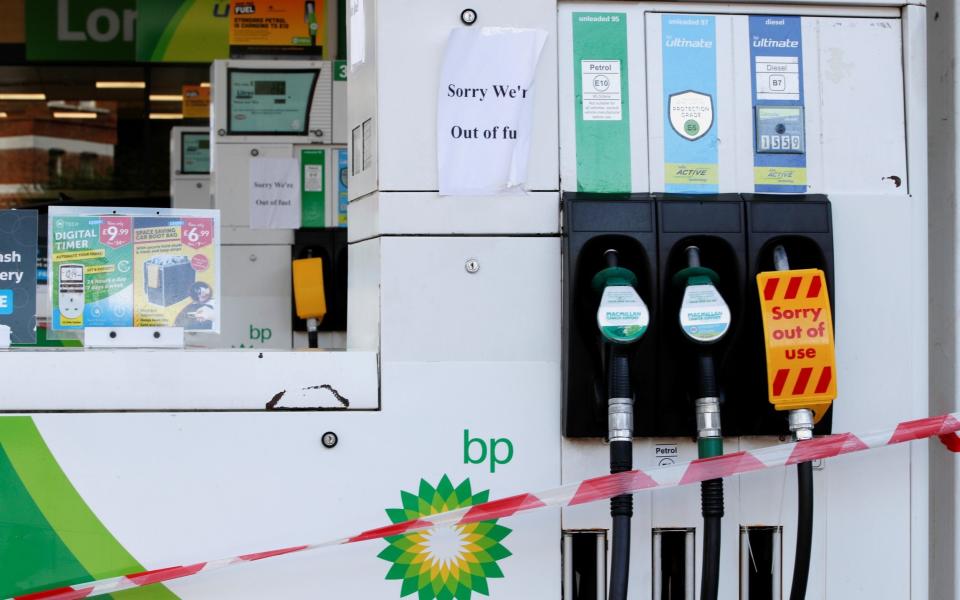Employers under pressure to let staff work from home to save petrol

Companies are under pressure to allow staff to work from home instead of driving into the office, after a weekend of panic buying at petrol forecourts across the UK.
Business groups and trade unions said workers could be delayed or left stranded on their commutes by a lack of fuel, and warned that travelling into the office unnecessarily risked worsening the crisis.
“We need to ensure emergency and community services are properly resourced as a priority and that employers allow more flexibility on working from home to reduce the strain on this avoidable crisis,” said Gary Smith, the general secretary of the GMB union.
“The run on the forecourts is unnecessarily affecting frontline workers in our ambulance and home care services and the rising cost of energy will cause distress for the lowest paid households trying to make ends meet.”
'Employers should be flexible'
Kate Bell, head of economics at the Trades Union Congress, said flexibility over home working was needed as pumps run dry.
"This could make journeys to work harder for some people,” she said. "Employers should be flexible and allow home working where possible if staff find it a struggle to get in."
The calls come as many office workers were only just returning to their workplaces, after almost 18 months largely working from home.
Richard Holden, the Conservative MP for North West Durham, said that the fuel crisis must not derail the return to normality.
'Unions want to risk Britain's recovery'
“This is a temporary issue which will be resolved shortly. Getting Britain back to work, which is a good thing for our country and economy, must happen now," he said.
"I cannot understand why some unions want to risk Britain’s recovery as we return from the pandemic. It sounds to me like Labour’s biggest paymasters are trying to play politics with people's jobs and our economy.”
The British Chambers of Commerce said more home working can only be a short-term measure as the Government must fix the crisis.
“Employers will of course be flexible where possible if the current difficulties with fuel are imparting on employees’ ability to get to work, but it is vital that the Government delivers a long-term fix to the issue as soon as possible,” said Clair Walker, co-executive director of the business group.
“Many people in important professions, such as care workers and food production staff, simply cannot work from home, so a comprehensive response is urgently needed to ensure our economy keeps moving.”
However, David D’Souza, membership director of the Chartered Institute of Personnel and Development, said businesses will be expected to offer flexibility to help workers and the wider economy, building on the experience of the pandemic.
'Keep fuel for those who need it most'
“It's important that fuel is kept for those who most need it. Whilst the logistical issues continue we expect organisations to offer or suggest working from home for those who are able. If staff must be on site, and can only attend using public transport, employers may need to bring some flexibility to working hours to accommodate this,” he said.
“The enforced change to working from home caused by the pandemic has introduced significantly more flexibility into many organisations, helping them respond to complex situations more quickly.
“As with anything impacting travel and infrastructure, employers that have the flexibility to offer working from home arrangements are at an advantage - as are their staff.”
Working from home has contributed to the fuel crisis, as officials at the Driver and Vehicle Licensing Agency (DVLA) are barred from processing "vocational" licences, including all applications for full HGV licences, unless they are in the office.
This has led to a backlog, which has added to the shortage of lorry drivers. The lack of drivers prompted the warnings about fuel supply to filling stations, which then sparked panic buying.
DVLA 'prioritising lorry driver licences'
A DVLA spokesman said: "We are prioritising HGV provisional licence applications, which are being issued in around two weeks.
"More complex transactions, for example if medical investigations are needed as part of a driving licence application, may face longer delays.
"There are delays in processing paper applications due to impact of recent industrial action and social distancing requirements, which means that we have fewer staff than usual on site.
"Once a driver has submitted their application they may be able to continue to drive while we are processing it, provided they have not been told by their doctor or optician they should not drive."

 Yahoo News
Yahoo News 